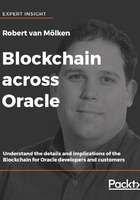
What are Oracle's competitors doing?
Now that we have established that Oracle is heavily investing in blockchain, you might wonder what Oracle's competitors are doing with this technology. The competition is not standing still either, so let's take a look at the hosted blockchain offerings, also called Blockchain-as-a-Service (BaaS), from the usual suspects including IBM, Microsoft, and Amazon Web Services (AWS), and newcomers like R3, Ethereum, and Blockstack. The following comparison is derived from a report prepared by 451 Research (https://cloud.oracle.com/opc/paas/ebooks/451_Reprint_Oracle_02OCT2017.pdf).
IBM offers a blockchain platform that runs on its Bluemix-powered cloud. The platform is based on the Hyperledger Fabric v1.0 framework, just like Oracle, and Hyperledger Composer, a rapid development tool for blockchain applications. It enables organizations to provision and operate their own secure blockchain-enabled business network quickly and develop and govern decentralized applications. Currently, it does not offer an administration console in any form. It runs the Hyperledger Fabric docker images in the cloud by executing the available scripts.
Amazon's AWS currently does not offer a specific blockchain service itself, but it invests in blockchain technology through its partner community. You can find offerings by partners in the AWS Marketplace, such as those that provide VM images that provision blockchain networks from different vendors. AWS did partner with the investment firm Digital Currency Group (DCG) to facilitate an experimentation environment for enterprises including financial institutions, insurance companies, and enterprise technology companies in order to spur innovation.
Microsoft also offers Blockchain-as-a-Service, but instead of one flavor, they provide multiple options. At the time of writing, I can find three solutions from Microsoft and 16 other solutions available through their partners, such as BlockApps, on its Azure Marketplace. Microsoft offers both Ethereum and Hyperledger Fabric as an option for their Azure Blockchain service and the choice of a single (Ethereum and Hyperledger Fabric) or multi-node network (Ethereum only). The single node service is designed for quick and easy development. For the multi-node network, Microsoft Azure Cloud provides an administration console for provisioning and configuring your network and minimalistic status pages where you can monitor the health of each node. The following screenshot shows the step where you define the size of your network:

Microsoft's offerings will change in the near future, as they announced their Coco framework in the fall of 2017. Coco is an open source system that enables high-scale, confidential blockchain networks. Its goal is to reduce the complicated development techniques needed to meet the operational and security needs of enterprises. Coco is not a standalone blockchain protocol, but rather a foundation that delivers efficient consensus algorithms and flexible confidentiality schemes. It implements a consistent, distributed, and persistent store (such as a key-value store) replicated across a trusted network of nodes, provides secure node-to-node and application-to-node communication, and delivers a codified governance model to support arbitrary, distributed policy management. More information about the Coco framework can be found on GitHub at https://github.com/Azure/coco-framework.
R3 is a distributed database technology company, and it leads a consortium of over 80 of the largest financial institutions to design and deliver distributed ledger technologies to global financial markets. It collaborates with its partners on research, experimentation, design, and engineering to bring the users of blockchain technology into the design and production process. Corda, the consortium's joint effort in creating an open source distributed ledger platform, is specifically designed to record and manage agreements between financial institutions. In the long term, R3 envisions a global ledger with which all economic actors will interact and that will allow any parties to record and manage agreements among themselves in a secure, consistent, reliable, private, and authoritative manner. More information about R3's Corda platform can be found at https://docs.corda.net/.
Ethereum is a public platform that supports programmable smart contracts, and decentralized applications can be built and deployed on top of it. Start-ups frequently use Ethereum as a foundation for their solutions or for crowdfunding (by minting a new cryptocurrency). In addition to Microsoft supporting Ethereum by offering it as part of its Azure Blockchain Service, in 2017, large banks such as JPMorgan Chase and ING, technology giants such as Intel, and 30 other organizations, formed the Enterprise Ethereum Alliance in order to focus on enterprise uses of Ethereum.
Blockstack is a new, decentralized internet where users can manage their own data and apps. This decentralized application platform provides services in the field of identity control and storage without any party having central authority. Blockstack technology protects information through the use of the blockchain and provides an open, interoperable system that transcends borders and organizations. Decentralized applications built for Blockstack run in a browser in which users give explicit read/write permissions to their data. Information is encrypted and stored on users' personal devices. There are no intermediaries, no passwords, and no massive data silos to breach.